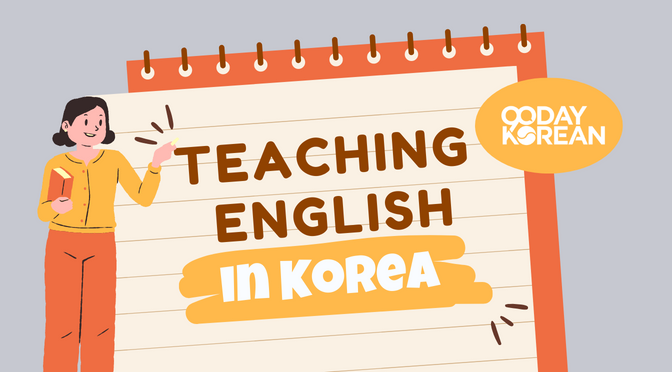In this article, we will go over what teaching English in Korea may be like. We’ll let you know how easy or difficult it could be to get such a job and give you some impression of whether it might be a thing you’d like to do.
Each method works for each person differently. But when it comes to living in South Korea specifically, for example, coming into the country as an English teacher may open some of the most advantageous ways to experience life in the country and the Korean culture.
Contents
Working in Korea
Some live abroad as digital nomads, while others become exchange or degree students. But whenever possible, many also move to a different country for a job, such as teaching the English language in South Korea.
South Korea is a country filled with tons of amazing cuisine, travel opportunities, and numerous fun ways to spend your daily life. And yet, being an English teacher in Korea may not be the right choice for everyone. Now, let’s see how you’ll feel about it as an option for you.
The country has many other work opportunities to offer. If you’d like to know more about jobs in Korea and where to find one, we have a dedicated article for that. But for now, we’ll focus on teaching careers in South Korea.
To live and teach abroad is always an invaluable experience. Even when times get hard, it can teach us a whole lot about ourselves, make us stronger and more resilient, and offer us ideas about what we want to do in the future, not to mention all the good times and memories you’ll have, which hopefully will be the majority of the time!
Types of Teaching Jobs in Korea
Not all of the teaching occupations available in South Korea are the same as the other. Aspiring teachers may teach in a public or private school, depending on their qualifications and preferences. We’ll discuss some of them here.
Below are the main types of English teaching jobs available in South Korea for foreigners.
Hagwon
A 학원 (hagwon) is a private academy or a similar institution where students of different ages go to get supplementary education in addition to what they learn during their school day.
Virtually every student in South Korea goes to a hagwon after school, often starting from the 1st grade of elementary school. Besides teaching classes in English, math, and other similar subjects, children can also take classes in music, art, baking, or taekwondo, among other similar options.
Teach English in a Hagwon
Teaching in a hagwon is not necessarily an easy job. However, it is the easiest kind of job to get to teach English in Korea unless you go through a specific program. There are incredibly many hagwons out there, and the requirements for a teacher are not as strict as they are in schools and universities.
However, to get a hagwon job, you do usually need certification in teaching English as a foreign language, such as a TEFL or TESOL certification. Even if you dream of teaching at a university, a job in a hagwon can be a great starting ground coming into South Korea. Through it, you’ll have an easy time getting placed in Seoul.
Working hours and leaves
Hagwons offer their teachers fewer vacation days a year than other options. However, the teaching hours are flexible, and depending on the hagwon, your roster of students can be quite diverse.
In some cases, the hours may be longer than other types of teaching posts, and there’s a lot more interaction with parents than you’d experience in a more traditional school environment.
Schools (public, private, international)
Teaching in South Korea in international, public, or private schools is popular for foreign teachers.
To get a teaching career at a public institution, you’ll typically have to apply for an English teaching program, such as EPIK (English Program in Korea), and get placed through them. EPIK is affiliated with the Korean Ministry of Education and places teachers in elementary schools or secondary public school positions.
While the quality of the job may be better by working in a school, many of the jobs are placed outside of Seoul and its metropolitan area.
In an international school, you’d be working in a privately owned school where the students are children of ex-pats or diplomats. As nearly all of the classes taught there are in English, it may, in some cases, also be possible to snatch a teaching job in a different subject.
However, in general, not many positions are open for international schools. If you get one, it can be a great gateway to getting to know the local ex-pat community.
Universities
Getting a job in English teaching at a Korean university is much rarer. However, they are perhaps also the most coveted English teaching job you could get in South Korea. The salary is generally quite competitive, and university teachers work fewer hours and get more holidays than other types of teaching posts.
Not to mention what a prestigious addition a university is to one’s resume! We actually have a separate article for how to land a university job in Korea if that’s something you’d be interested in going after right away.
Teaching at a university level is likely more challenging in terms of the content taught, but your students are also likely to be incredibly motivated to learn.
Private Tutoring
This can be another method of teaching English in South Korea that you can earn money with. However, if you are in South Korea on an E2 visa, which is a teaching visa, you are not allowed to tutor students privately on the side. If you have managed to exchange onto an F-visa, on the other hand, it is possible to take up private tutoring as well.
Teaching English in South Korea Salary
When it comes to teaching abroad, specifically teaching English as a second language (ESL) jobs all around the world, not many countries pay their teachers as much as South Korea does. The starting salary for ESL teachers can be as low as $1,350 in local currency, but typically, in that case, you are working a part-time job in a hagwon.
For full-time jobs, the teaching salaries can go as high as over $4,000 a month. The best and most competitive salaries are typically offered by universities and prestigious private schools.
Even if the salary offered is not on the highest end, it’s often relatively easy to earn and save money while teaching English in South Korea. For example, one benefit that some English teaching positions offer is free housing or free accommodation. And in addition, sometimes they may even offer free flights to Korea!
Salary for public school teachers in Korea
If you work in a public institution, you are employed by the South Korean government, and you will also be paid accordingly. Currently, the pay range in public schools is around $1,200 to $2,450. If your job is through the SMOE program, your average salary will be the highest of the different programs. Meanwhile, the average salary for the EPIK program is the lowest.
In the next section, we will go over each of these programs, which will also highlight better why the salary for one looks higher than the one for another. By working for the government, you also don’t need to negotiate your salary, as it is predetermined. The pay range for private and international schools is quite similar.
Salary for hagwon teachers
In a hagwon, you will typically get paid between $1,500 and $1,900. It is decided based on your skills and experience level, and it may be negotiated. There may be some differences in salaries between different hagwons.
If you are just starting out as a teacher, you may get a higher salary than you would in a public institution. However, experienced teachers may not have such a benefit.
Salary for university teachers
A university job’s salary can range anywhere between $1,800 and $2,800. It depends on the university you teach at, as well as your previous teaching experience. Even if you are offered a salary on the lower end, note that you will likely work fewer hours than in other types of teaching jobs.
English Teaching Programs in Korea
To get a job teaching in Korea, you can always use a recruiter and find work independently. You can read more on this entire process in our article for recruiters in Korea. With the help of a recruiter, you can especially find jobs in the various hagwons, but many offer job opportunities in schools as well.
However, if you’d like to work in a public school, in particular, you typically want to get employed through an English teaching program, two of which were mentioned briefly above.
Working in public schools is typically seen as a beneficial opportunity by English teachers in South Korea. Here are the programs with which you can find public school jobs:
SMOE (Seoul Metropolitan Office of Education)
Here’s the program for you if you are dead set on teaching in a public institution in Seoul. The job placement is within the capital city, and they also have the highest starting salary on average. However, do note that the higher salary is mostly due to the fact Seoul is the most expensive place in South Korea to live.
GEPIK (Gyeonggi English Program in Korea)
With GEPIK, you will not get placed in Seoul at all.
However, all of the placements are within Gyeonggi region, which surrounds Seoul. Thus, even though you live and work outside of Seoul, you’ll still have incredibly easy access to Seoul if that’s where you’d like to spend time. Many of the towns and cities in Gyeonggi are incredibly nice to live in and explore, too.
EPIK (English Program in Korea)
This program is by far the biggest for English teaching in many schools in Korea. It can place you in any region in South Korea except Gyeonggi and Seoul. That may sometimes mean a more rural location, but it also covers bigger cities like Busan and Daegu.
Because its placements are not as close to Seoul as the other two programs, EPIK is not as competitive to get into. However, EPIK can actually be a great opportunity to experience the country outside of Seoul.
Teaching English in Korea Requirements
Below is a list of requirements for those wishing to teach English in South Korea. Some of them may vary depending on what type of job specifically you’re looking to have.
You must be a native English speaker from a specific country. Unless you already have an F-visa, you can only get sponsored for an E-visa if you are from a recognized English-speaking nation or you’re a native English speaker.
In addition, you most likely have to have a passport from one of the following countries: the United States, Canada, United Kingdom, Australia, New Zealand, or South Africa.
You must have a bachelor’s degree. It doesn’t actually matter what your degree is in, except for some cases, but you do have to have some amount of university education under your belt to get hired and sponsored.
You must pass a criminal background check. Indeed, if you have any charges or convictions against you, then you automatically do not qualify for a teaching visa in South Korea. And yes, this does include misdemeanors.
You probably need some sort of teaching certification. Not every employer will require one if you work for private academies exclusively. However, if you want to teach at a school and, in general, get better job offers, you’ll want to have TESOL, CELTA, or TEFL certification.
You might like to have a master’s degree in a field related to teaching. If you teach English in a private academy or a school, you won’t need to worry about a master’s degree. However, if you have one, you’ll have a far easier time scoring a job at a university.
You will find it useful to know Korean beforehand. Of course, this is not in any way a requirement, but it will make your time in South Korea so much easier from the start.
Wrap Up
And there you go! Now, you should have a better-educated idea of what teaching English in South Korea might entail. If you think it’s something you’d enjoy, it might be time to start searching for jobs and putting together your paperwork! You can always refer to our article recruiters in Korea for additional information.
Have you considered teaching English abroad, specifically teaching English in Korea? Or have you had such an experience already? Let us know below in the comments!






